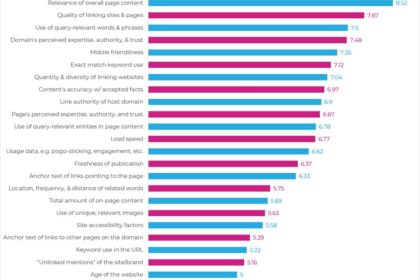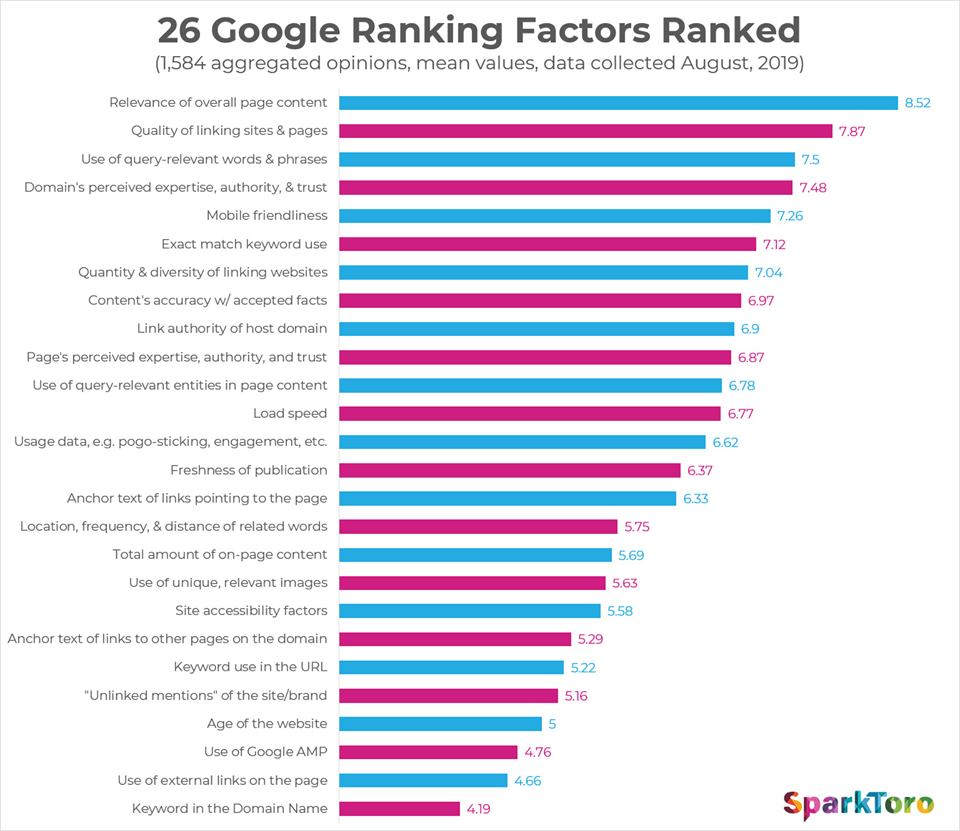
Despite my frequently sharing that I don’t do SEO, an SEO piece for those trying to figure it out. One of the most notable people in Search, Rand Fishkin, just published this data.
The 26 Google ranking factors, prioritized.
Largely working with startups and new ventures, it’s clear that countless continue their search for “SEO” without really knowing what it actually means to be meaningful to Google. This week alone (and it’s Monday), I’ve had a half dozen chats with people seeking someone who can help them show up and get leads from Google.
This chart is brilliantly valuable, for those that know what to do with it.
Given so many don’t [know what to do with it], I thought we’d take a crack at as brief an explanation as possible.
Perhaps others will join me in explaining more; I’m only going to focus on the top 10 of 26 Google ranking factors (and that focus alone will probably elucidate why you’ll often hear me say that everyone in your organization has to be aware of their impact on search, if you want search engines to be meaningful for you)
How to SEO, Considering the Top 10 Google Ranking Factors
Relevance of overall page content — Is the page relevant to what people are seeking? Who figures this out? — keyword research?? Eh… Relevance means relevant to your brand, your customer, your market, and more. Overall page content means that *someone* is designing a site, architecture, and UX that creates pages relevant to those audiences. Is this top most of priorities something simply accomplished by a hire, or is Marketing and your Web Dev aligned in lock step about what one another are doing?
Quality of linking sites & pages — Surely, you’ve heard of “link building,” yes? What is that? Merely asking sites for links? Perhaps you get as much spam as I do from companies asking if they can add content to enhance an article you’ve written, or provide a guest post? They’re link building (poorly). How are is your site and business getting links from the Wall Street Journal, partners, wikipedia, and the like? How might you accomplish that?
Use of query-relevant words and phrases — Take a look at some websites; hopefully you’re already very familiar with your competitors’ websites. Most sites design pages to match keyword they think relevant (or typical of site designs). i.e. “About Us.” Are you designing and creating content based on what people are seeking or where you want to rank? How you ever considered how many people are seeking “About Us”?
Domain’s perceived expertise, authority, & trust — For startups this is tough to accomplish but important appreciate what it means. Credible AND relevant sites have people naturally talking about them. Is that “SEO” or a result of building a great company and product/service?
Mobile friendliness — What are you web developers doing right now? Go check. Does you’re site work as well, if not better (since you likely get more traffic on mobile devices) than on a desktop browser?
Exact match keyword use — This matters. This is how people selling SEO trick you into perceiving that they’re good; they’ll make a site, perhaps their own, rank really well for a specific search – see! You can do this too! Hence keyword research and content creation being what most, perhaps you, think is paramount. Appreciate the ranking factor though; if you’re going to exact match keywords, all the possible keywords, that’s a lot of pages/content.
Quantity & diversity of linking websites — Simple: a few vs. many, and a great variety, of them. What is your BD team, CEO, PR, social media, and more doing to foster that? Confused why I ask that question? Recall the idea of link building from above – is it really conceivable that one person, or your marketing team, can capably get links from a diverse and authoritative depth of sites? Why can’t your CEO, PR, social media teams, and more being conscientious of this and doing something about it?
Content’s accuracy w/ accepted facts — What do review sites, white papers, authoritative sites, and more, reinforce as consistent and accurate in what you’re saying? Appreciate how conflicting information can be accounted for… now appreciate all that you might do to ensure information is accurate, everywhere.
Link authority of host domain — This comes with time and the value delivered as a business. Hence my broader, initial advice: everyone on your team has to be conscientious of this stuff. You can’t just keyword and content your way to good search results.
Page’s perceived expertise, authority, and trust — final thought, as an example of this: What is YOUR authority? Your personal authority. How engaging are you on social media or in the press? That question isn’t all this is saying, nor what matters here, explicitly; I just wanted to make the point that a factor in a PAGE rank (or more precisely, an article or blog post), is WHO is posting it. You. What kind of engagement do you have for your content on LinkedIn? Facebook? or with an audience on Twitter that over time affirms that you (and your pages) have expertise and trust?
FWIW. No simple answers to this stuff and assuredly others can share other examples, tips, and suggestions.
Rand has an exceptional personal analysis here, if you’re looking to dig deeper. My goal was only this… take a list like this, a list of what matters, and appreciate that what it’s showing is NOT how you can just find a person to DO THIS. The challenge (or opportunity) is that online, everything matters.




Jennifer Ratliff
This is a long and overwhelming list for those who aren’t practitioners so I’m sure your notes are appreciated.
While I agree you can’t just hire somebody to DO THIS for you, you CAN hire someone that has enough knowledge to explain why all of these factors are relevant and provide steps for integrating these factors into existing processes with proper prioritization. It’s just hard to find “SEOs” who will actually partner with businesses to do this. Automated audit and recc tools are easy – understanding and providing roadmaps for transforming to search-driven marketing processes is much more difficult.
As a Digital Marketer, I am surprised to see ‘keyword in domain name’ even on the list. I thought this was discredited long ago.
From my experience these factors vary greatly, depending on the type of site. E-A-T is super important for News/Media, Ecom, Health, etc.
UI/UX plays a pretty big role as well. When all the standard onsite/offiste boxes were checked using hotjar helped me push a blog from ~5-6 ranking to 1
But my local SEO clients? LOL
Can rank them in 2 days (super niche). GMB Tricks + Content + Links – Even throw a PBN directly at it… it’s stupid easy right now.
I suspect Google will catch up with the PBNs soon enough as I’m also surprised how easy it is to use them.
Lori Appleman me too! I think local search is going to have a major surprise on one of the next updates.
I am surprised to find “exact match” is still anywhere near the top as semantic language has had a huge impact and I see lots of pages rank for keywords not present on the page. So much so, I worry far less about Yoast scores.
what are you basing your scoring off of these days to negate Yoast? I’ve noticed it’s inaccuracies as of late as well
I don’t negate Yoast. I use other tools. SEMRush’s writing assistant has worked like a magic charm
feeding this to my ai